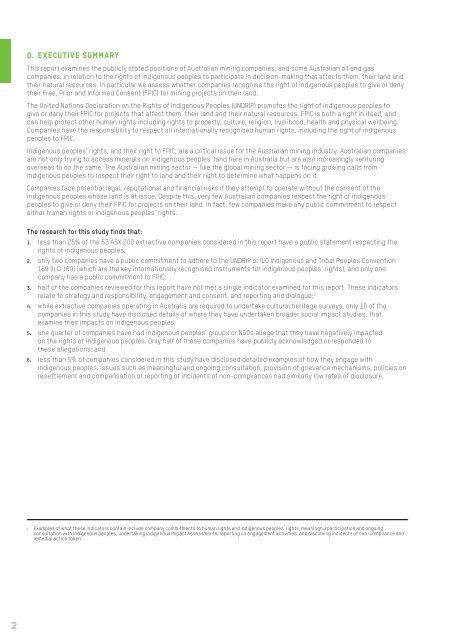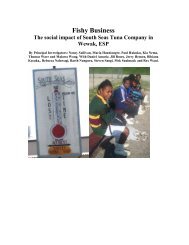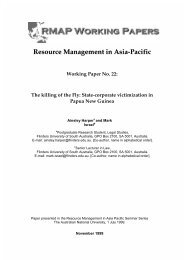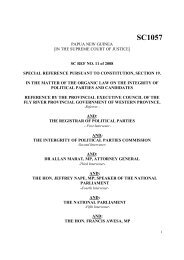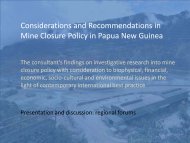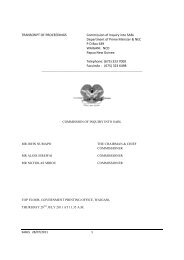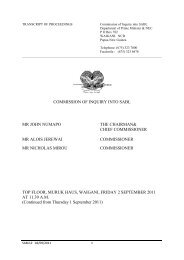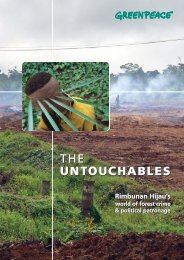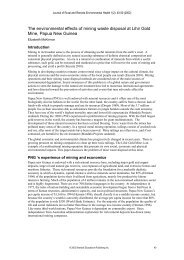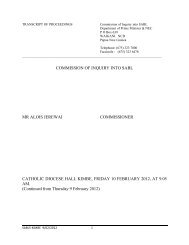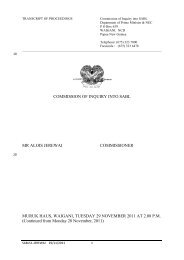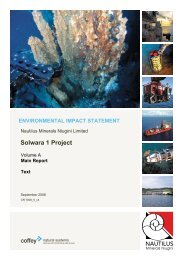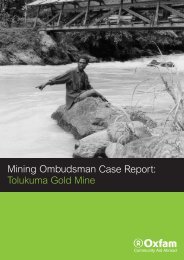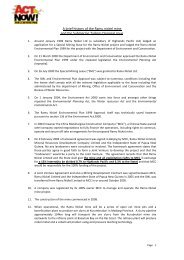Oxfam Australia and CAER: The right to decide
Oxfam Australia and CAER: The right to decide
Oxfam Australia and CAER: The right to decide
Create successful ePaper yourself
Turn your PDF publications into a flip-book with our unique Google optimized e-Paper software.
0. executive summary<br />
This report examines the publicly stated positions of <strong>Australia</strong>n mining companies, <strong>and</strong> some <strong>Australia</strong>n oil <strong>and</strong> gas<br />
companies, in relation <strong>to</strong> the <strong>right</strong>s of indigenous peoples <strong>to</strong> participate in decision-making that affects them, their l<strong>and</strong> <strong>and</strong><br />
their natural resources. In particular we assess whether companies recognise the <strong>right</strong> of indigenous peoples <strong>to</strong> give or deny<br />
their Free, Prior <strong>and</strong> Informed Consent (FPIC) for mining projects on their l<strong>and</strong>.<br />
<strong>The</strong> United Nations Declaration on the Rights of Indigenous Peoples (UNDRIP) promotes the <strong>right</strong> of indigenous peoples <strong>to</strong><br />
give or deny their FPIC for projects that affect them, their l<strong>and</strong> <strong>and</strong> their natural resources. FPIC is both a <strong>right</strong> in itself, <strong>and</strong><br />
can help protect other human <strong>right</strong>s including <strong>right</strong>s <strong>to</strong> property, culture, religion, livelihood, health <strong>and</strong> physical wellbeing.<br />
Companies have the responsibility <strong>to</strong> respect all internationally recognised human <strong>right</strong>s, including the <strong>right</strong> of indigenous<br />
peoples <strong>to</strong> FPIC.<br />
Indigenous peoples’ <strong>right</strong>s, <strong>and</strong> their <strong>right</strong> <strong>to</strong> FPIC, are a critical issue for the <strong>Australia</strong>n mining industry. <strong>Australia</strong>n companies<br />
are not only trying <strong>to</strong> access minerals on indigenous peoples’ l<strong>and</strong> here in <strong>Australia</strong> but are also increasingly venturing<br />
overseas <strong>to</strong> do the same. <strong>The</strong> <strong>Australia</strong>n mining sec<strong>to</strong>r — like the global mining sec<strong>to</strong>r — is facing growing calls from<br />
indigenous peoples <strong>to</strong> respect their <strong>right</strong> <strong>to</strong> l<strong>and</strong> <strong>and</strong> their <strong>right</strong> <strong>to</strong> determine what happens on it.<br />
Companies face potential legal, reputational <strong>and</strong> financial risks if they attempt <strong>to</strong> operate without the consent of the<br />
indigenous peoples whose l<strong>and</strong> is at issue. Despite this, very few <strong>Australia</strong>n companies respect the <strong>right</strong> of indigenous<br />
peoples <strong>to</strong> give or deny their FPIC for projects on their l<strong>and</strong>. In fact, few companies make any public commitment <strong>to</strong> respect<br />
either human <strong>right</strong>s or indigenous peoples’ <strong>right</strong>s.<br />
<strong>The</strong> research for this study finds that:<br />
1. less than 25% of the 53 ASX 200 extractive companies considered in this report have a public statement respecting the<br />
<strong>right</strong>s of indigenous peoples;<br />
2. only two companies have a public commitment <strong>to</strong> adhere <strong>to</strong> the UNDRIP or ILO Indigenous <strong>and</strong> Tribal Peoples Convention<br />
169 (ILO 169) (which are the key internationally recognised instruments for indigenous peoples’ <strong>right</strong>s), <strong>and</strong> only one<br />
company has a public commitment <strong>to</strong> FPIC;<br />
3. half of the companies reviewed for this report have not met a single indica<strong>to</strong>r examined for this report. <strong>The</strong>se indica<strong>to</strong>rs<br />
relate <strong>to</strong> strategy <strong>and</strong> responsibility, engagement <strong>and</strong> consent, <strong>and</strong> reporting <strong>and</strong> dialogue; 1<br />
4. while extractive companies operating in <strong>Australia</strong> are required <strong>to</strong> undertake cultural heritage surveys, only 10 of the<br />
companies in this study have disclosed details of where they have undertaken broader social impact studies, that<br />
examine their impacts on indigenous peoples;<br />
5. one quarter of companies have had indigenous peoples’ groups or NGOs allege that they have negatively impacted<br />
on the <strong>right</strong>s of indigenous peoples. Only half of these companies have publicly acknowledged or responded <strong>to</strong><br />
these allegations; <strong>and</strong><br />
6. less than 5% of companies considered in this study have disclosed detailed examples of how they engage with<br />
indigenous peoples. Issues such as meaningful <strong>and</strong> ongoing consultation, provision of grievance mechanisms, policies on<br />
resettlement <strong>and</strong> compensation or reporting of incidents of non-compliances had similarly low rates of disclosure.<br />
1. Examples of what these indica<strong>to</strong>rs contain include company commitments <strong>to</strong> human <strong>right</strong>s <strong>and</strong> indigenous peoples’ <strong>right</strong>s, meaningful participation <strong>and</strong> ongoing<br />
consultation with indigenous peoples, undertaking Indigenous Impact Assessments, reporting on engagement activities, <strong>and</strong> disclosing incidents of non-compliance <strong>and</strong><br />
remedial action taken.<br />
2


